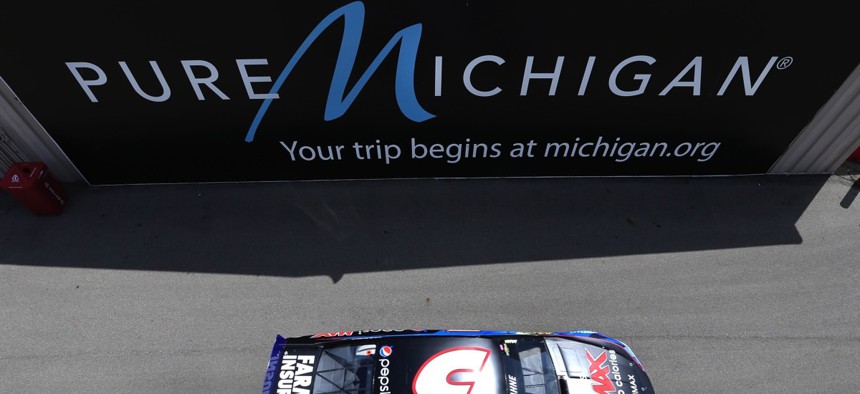Calls to Ax Michigan’s Promotional Campaign; Agency Rejects Trump-Related Underwear Ad

NASCAR Sprint Cup series driver Kasey Kahne drives to the garage during practice for the Pure Michigan 400 auto race at Michigan International Speedway in Brooklyn, Mich. Paul Sancya / AP Photo
Also in our State and Local Daily Digest: Suspicious energy tax credits in Oregon; taxpayer cash pays for beads and drill batteries in Maine campaigns; Pennsylvania vaping ban.
TOURISM | "Michigan taxpayers may love seeing their town or favorite destination highlighted but they deserve to know they're paying a hefty price tag for those ads with very little to show for it," said Michael LaFaive, Mackinac Center Morey Fiscal Policy Initiative director, of the Pure Michigan tourism campaign. The free-market think tank argues the program should be shut down because, for every $1 million increase in funding, hotels and motels only see a $20,000 benefit. [MLive.com]
PUBLIC TRANSIT | The Bay Area Rapid Transit agency has rejected an underwear advertisement which uses the word “pussy” in reference to comments made by Republican presidential nominee Donald J. Trump about grabbing a woman’s genitals. A company called THINX had proposed the advertisement for a San Francisco BART station. [San Francisco Examiner]
TAX CREDITS | A forensic audit of Oregon's Business Energy Tax Credit Program has turned up 165 projects with $347 million in questionable tax credits. Some of the companies identified as receiving suspicious credits in the audit are major players in the state’s renewable energy and forest products industries. [The Oregonian]
CAMPAIGN FINANCE | Some items legislative candidates are spending taxpayer-financed campaign money on under Maine’s Clean Election Act are raising eyebrows. Candy, party beads and drill batteries are among the expenses. “These may be legitimate campaign expenses, but it really doesn’t seem to be the best prioritization of taxpayer money to buy things like robocalls and junk mail,” said one state lawmaker. [Portland Press Herald]
VAPING | The Board of Health in Allegheny County, Pennsylvania voted unanimously Wednesday to ban vaping indoors in public places and workplaces in the county. “I'm blown away,” said Marc Conn, co-owner of a business called Steel City Vapors. The ban still needs approval from the county council. [TribLive]
ELECTIONS | The makeup of Virginia Beach, Virginia’s next City Council might very well come down to who’s on board with extending light rail from Norfolk to the city’s center and how residents vote on a referendum funding the project. [The Virginian-Pilot]
TAXES | Legislative candidates in Kansas are backing a lower state tax on food sales. But reducing the tax could be difficult with the state facing a nearly $75 million budget shortfall. At 6.5 percent, Kansas’ sales tax on food is the second-highest in the nation. [The Wichita Eagle]
MUNICIPAL FINANCE | As New Jersey Gov. Chris Christie’s administration moves closer to declaring a state government takeover of cash-strapped Atlantic City. “Any number of things can happen,” said Marc Pfeiffer, Bloustein Local Government Research Center assistant director, including the city resubmitting its five-year recovery plan. [NJ.com]
PUBLIC ART | The Department of Transportation and Public Works in Miami-Dade County has unveiled five new buses fully wrapped in art pieces. The pieces were selected as part of a project called Transit Loves the Arts. [Miami Herald]
TRANSIT | According to a new study, a proposed gondola system spanning the Potomac River between Washington, D.C. and Arlington County, Virginia, is legally permissible and feasible decided to build a gondola spanning the Potomac River. Although a cable-propelled system between Georgetown and Rosslyn may sound far-fetched, it would have some real benefits—one of them being less congestion over the Key Bridge. The study found the system would cost between $80-90 million to construct. [The Washington Post]
BEARS | A bear climbed into a tree outside the St. Louis County Courthouse in Duluth, Minnesota on Wednesday, creating a standoff of sorts and drawing onlookers. By Thursday morning the bear was gone, according to reports on social media. [Minnesota Public Radio]
NEXT STORY: Creating the accessible website





